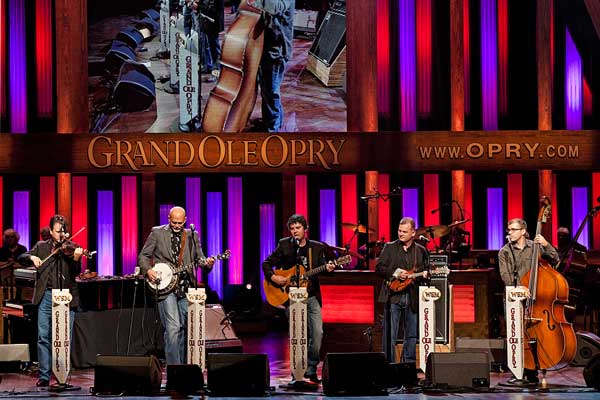The 30th anniversary Lonesome River Band lineup: (from left) Mike Hartgrove, Sammy Shelor, Brandon Rickman, Randy Jones, Barry Reed: what you remember most is how everything they play sounds lived in. (photo:AnthonySP.com)The Heart of the Matter
Lonesome River Band celebrates 30 years in style
By David McGee
CHRONOLGY, VOLUME ONE
Lonesome River Band
Rural RhythmIn honor of its 30th anniversary, the Lonesome River Band has come up with the interesting idea of celebrating each decade of its lifetime with an individual EP of revisited versions of tunes the band defined during each decade, and which in turn defined the band as one of contemporary bluegrass music’s top echelon practitioners. Volume One honors the band’s first decade following its formation in 1982. No one remains from the original lineup headed by rhythm guitarist/vocalist Tim Austin, but Sammy Shelor, one of the stellar banjo players of his generation, remains as a link to the LRB’s early days. Shelor made his debut on record as a band member on 1991’s acclaimed Carrying the Tradition, and indeed, his blues-tinged banjo carries the tradition forward here, kicking off an emotionally charged take on “The Game Is Over,” from the aforementioned album, featuring newest member Randy Jones in a starring role with a heartbroken lead vocal and a tasty, succinct mandolin solo, as Mike Hartgrove augments the ambiance with his plaintive fiddling. Shelor’s banjo also sets the stage for another tune from the 1992 long player, the five-and-a-half-minute “Hobo Blues,” a moody piece that begins with two minutes of a seemingly improvised instrumental dialogue of a foreboding nature between Shelor, Hartgrove, Jones, Brandon Rickman on guitar and Barry Reed on a rumbling bass; Rickman and Jones share lead vocal duties on this traveling song (penned by Billy Smith), the big difference between it and the original being the striking depth the singers deliver in a low-key setting, adding intensity but also suggesting a certain world weariness at the root of their wanderlust. As much as any of the eight songs here, “Hobo Blues” illustrates the intriguing balance of progressive and traditional approaches LRB has traded on in fashioning its sound signature since Shelor came on board; the current lineup is the most adept yet at bridging stylistic boundaries, and in Rickman and Jones--the former muscular voiced and sturdy, the latter an emotive tenor who easily ascends into the revered high lonesome territory—the group boasts its finest vocalists ever.
Lonesome River Band performs ‘Mary Ann,’ one of the standout tracks on Chronology: Volume One. Live at Nashville’s Station Inn, September 28, 2011.Stepping back into the pre-Shelor days, the band offers two tunes from LRB’s hard-to-find self-titled debut album: the driving backwoods tale “The Old Man In the Shanty,” keyed by Hartgrove’s expressive soloing and tasty Shelor soloing in support of Rickman’s moving vocal, is essentially a male version of one of Dolly Parton’s early chart toppers, “Joshua,” also concerning a reclusive gent avoided by all but the singer, who tells a tale of befriending him and seeing a different side than the hermit ever showed the public. The album’s big ballad moment comes in “Mary Ann,” once a Jimmy Martin staple, here delivered as a pure country heartbreaker, with haunting harmonies; stark, lonely solos by Shelor and Hartgrove; and a powerful, aching vocal by Rickman that by design or by accident nods to George Jones in the way Rickman adds a consonant to make “live” sound like “lilve”—which has the curious effect of deepening the sadness in his voice (he also has a nice guitar solo about halfway through) in a beautifully nuanced performance.
Also from the pre-Shelor days, specifically the 1987 Saturday Night, Sunday Morning album, comes the bitter beauty of Eric Anderson’s searing kissoff number, “Close the Door Lightly When You Go,” which introduces Chronology in style, with Jones’s gem of an aching vocal, stirring harmonies and fiery solos by Hartgrove and Jones in a version comparable to a powerful rendition of the tune featured on the only album thus far by the Skylighters (2006), with Eric Brace on lead vocals. From 1989’s Looking for Yourself, “Laura Jean,” fueled by Jones’s warm lead vocal, is rich in keening harmonies in a high stepping arrangement further augmented by Jones’s lively mandolin work; and “I’m Afraid To Love You Anymore” is an occasion for some rousing group harmony singing advancing a tale of faithless love delivered in a deceptively uptempo groove. Closing out the disc and setting up Volume Two is a newly recorded instrumental version of the traditional “Angeline the Baker,” a buoyant toe-tapper showcasing not only the dramatis personae’s daunting technical skills but also their way of getting into the soul of a song, even an instrumental, and drawing out its humanity, so that what you remember most is how everything they play sounds lived in. A rare gift indeed, this, and reason enough to salute the Lonesome River Band for three decades of memorable music and to look forward to the next installment of its retrospective.
The Lonesome River Band’s Chronology: Volume One is available at www.amazon.com
Founder/Publisher/Editor: David McGee
Contributing Editors: Billy Altman, Laura Fissinger, Christopher Hill, Derk Richardson
Logo Design: John Mendelsohn (www.johnmendelsohn.com)
Website Design: Kieran McGee (www.kieranmcgee.com)
Staff Photographers: Audrey Harrod (Louisville, KY; www.flickr.com/audreyharrod), Alicia Zappier (New York)
E-mail: thebluegrassspecial@gmail.com
Mailing Address: David McGee, 201 W. 85 St.—5B, New York, NY 10024



